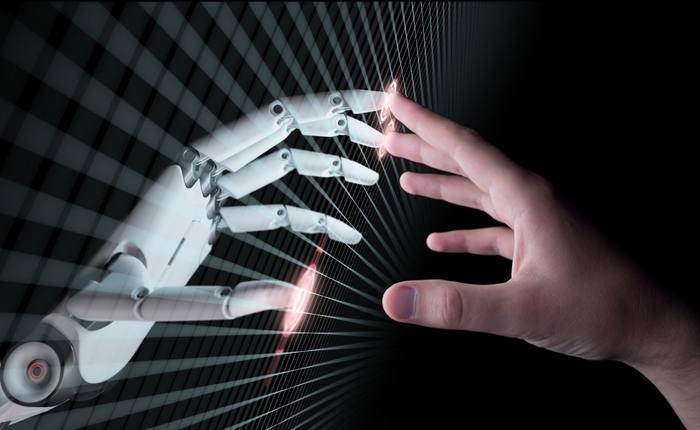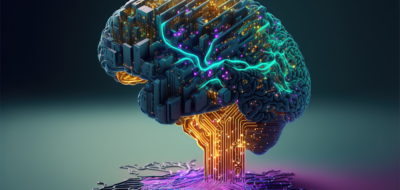Here are a few tips which I hope will be helpful to transform your business through technology.
I am confident we will soon reach a point where we will no longer view artificial intelligence as a mysterious dark force, and will see the media frenzy over this concept begin to subside. It is now time for calm assessments and early conclusions. We will look closely into whether AI algorithms and neural networks actually improve efficiency and increase sales. We will be checking whether our analytical tools actually enable us to anticipate buyer behavior. The capabilities of smart technologies are increasingly verifiable. This article is dedicated to leaders and key specialists, and especially all those who are wondering how to bring new technologies into their companies while retaining control over their organizations and being able to predict developments. Here are a few tips intended to help you embark on a journey of digital transformation.
1. Do not demonize artificial intelligence
So, you’ve you been wondering how to exploit machine self-learning in your organization. Excellent. Do not let the media make you think you are entering into a pact with dark forces. Artificial intelligence can work with people rather than replacing them. It can help restructure business units and entire organizations, accelerate processes and facilitate decision making. It can even teach the people who will work with AI to think and be visionary. It will reveal its full capabilities provided you recognize that its main use is to tap the potential of your employees. And perhaps also the hidden potential that lies in your company’s products and services. Make sure your managers adopt this mindset.
2. Analyze your models
There are two ways you can approach smart technologies. Either you allow them to take your company to a whole new level and ascend to the global digital ecosphere (through a company-wide revolution), or have it fix or improve a specific issue, unit or process while the company itself continues business as usual. Both scenarios are possible. The key questions to ask yourself, regardless of your intentions, is how your company has been processing information and supporting data flows and how its approach has impacted the bottom line, customer service, unit management, and communication among employees. Has your current technology made a significant contribution to the company’s key processes? Where did your organization create added value for customers?
Effective and efficient data management is key to productivity across the organization. New technologies can take your company to a whole new level. However, for this to happen, it is essential to closely examine the solutions in place and reveal their weaknesses.
3. Trust your intuitions, resolve your doubts
The above will help you define the scale of the changes and the areas they should affect. Do you wish to collect data on customer behavior and analyze “user experience”? Or perhaps improve information exchange between distributors, traders and merchandisers? Or – as could be the case with medical and pharmaceutical companies – have data processing lead to breakthroughs and revolutionary insights and decisions? You are well advised to run your premonitions and misgivings by outside experts. They will tell you whether, in order to adopt new solutions, you will need to build your company’s systems from the ground up, or if new solutions can be embraced without upsetting the current order.
4. Remember that new data management will create new relationships
This year’s McKinsey Global Institute report “Skill shift: Automation and the future of the workforce” suggests that demand for employees with advanced technical skills – analysts, engineers and programmers who will manage the data stream – will increase significantly over the next few years. That is not all. Specialists will be sought, whose main job will be to create new relationships in the company. New technologies will affect employees’ behavior, prompting them to find new ways to deliver on their responsibilities and approach relations with other people. You will need psychologists, trainers and specialists to help you manage processes on the man-machine interface.
5. Help your workers understand technology
Managers feel that technology is no longer “transparent”. Put humorously, you might say: “So my car can drive all by itself, but how come it can do it so well”? What we want is for our data to be processed perfectly and help us make best decisions. Our unease results from not knowing how exactly analytical programs reach their conclusions. We remain suspicious.
Leaders need to prepare for the fact that innovative solutions will inevitably make workers anxious. They must anticipate such questions as: “Will automation upset our business unit? What controls should we adopt?”
How should leaders respond? Watch and listen. Foster internal communication. And above all, raise worker awareness by creating education and self-improvement opportunities. A good communication and education policy and regular team briefings on deployment progress, have the power to avert crises. By going over the best approach to change with your team members, you will make them comfortable with technology.
6. Think beyond profit
Bottom line impact remains the key concern on any new project. However, given the sheer potential of AI and other new technologies, it may at times be smarter to “suspend” that focus. The courage to take risks, the ability to accept failure and push for continuous improvement are increasingly valued in today’s business. As new technologies change the world around us without revealing all of the possibilities, there is often no other choice but to leap into the unknown. By clinging to quick, low-risk profit, which is theoretically a safe way to do business, a company may thwart its growth and waste opportunities to rise to a completely new market position and technological status. To make your organization grow, consider it crucial to sail into uncharted waters.
7. Bye bye, hierarchies
Sooner or later, the change you are facing will affect the way your company is run. Come to terms with the fact that hierarchical top-down decision-making models are becoming obsolete. Today’s technologies do not mix well with authority and display a low tolerance for artificially-preserved hierarchies. Instead, they favor multi-level cooperation. The biggest challenge for today’s leaders is to combine hierarchies with decentralization. The ability to choose which areas to “let go of” and delegate to the team, and which to continue to control, will be at a premium. One thing is certain: technology has a way of exposing human errors. It is therefore wiser to prepare to surrender much of our power.
I hope that some of the above observations will prove useful in building new digital business models. And if you are already familiar with this advise, perhaps it will make you feel you are not alone in the transition process and have other like-minded people around you.
. . .
Works cited
Jacques Bughin, Eric Hazan, Susan Lund, Peter Dahlström, Anna Wiesinger and Amresh Subramaniam, Skill shift: Automation and the future of the workforce,McKinsey Global Institute, link, 2018.
Martin Lundqvist and Peter Braad Olesen, Digitizing the delivery of government services,McKinsey Global Institute, link, 2017.
. . .
Related articles
– Automation will not destroy all jobs
– Blockchain poised to shake up our lives
– Will quantum computers doom the blockchain?
– Artificial Intelligence for big players only










Peter71
For this danger to be realized, the hypothetical AI would have to overpower or out-think all of humanity, which a minority of experts argue is a possibility far enough in the future to not be worth researching. Other counterarguments revolve around humans being either intrinsically or convergently valuable from the perspective of AI.
PiotrPawlow
Machines don’t possess “behavior” Norbert – behavior is a purely human activity and trait — as is “accomplishment”.
You’re article is creepy — time to get out of the dark room and interact with the humans you seem to so insistent to discount and diminish.
Jack666
We are living in a age concerned with novelty, where technology and its capabilities are increasing every day. We are saturated with information but at the same time we have a fragile communication, human relationships are being affected because we are not interested in thinking about the other.
In my opinion, the problem isn’t technology it is what is inside the human being like ambition and egoism. Is a fact that the world needs a balance and through technology we have improved many aspects in our lives, but the wrong way which we have used it has been and will cause many problems for us. Advances in technology started with a need for humanity to improve its quality of life but if we lose the balance, AI is a benefit only for a minority of the population and this population doesn`t always have the best intentions as we are already seeing.
The solution could be simpler that we imagine, recognizing that our human value is more important that any ambition for power, but, are we willing to take this step?
Dzikus99
Computed methods for automated reasoning, learning and perception have become a common phenomenon in our everyday lives. We have our Siri or Cortana to help us out.
The smartphone is an apt and everyday example of how we use AI. We are also hitting the road for long drives and trips with the help of GPS. In utilities, we find that they can predict what we are going to type and correct the spellings. That is machine intelligence at work.
When we take a picture, the AI algorithm identifies and detects the person’s face and tags the individuals when we are posting our photographs on social media sites.
Guang Go Jin Huan
Robots are already being built that have some of these brain mechanisms operating on neuromorphic chips, which are computer chips that mimic the brain by implementing millions of neurons. So maybe robots could get some approximation to human emotions through a combination of appraisals with respect to goals, rough physiological approximations, and linguistic/cultural sophistication, all bound together in semantic pointers.
Simon GEE
I’m Kind of confuse about this topic, because on one hand I think AI will provide us greats opoortunities to evolve in diferent areas such as massive production, economy, advances for health, globalization, communication, do works, etc; which will be great for humanity cause in that way we could get in charge of other important aspects in our lifes.
But on the other hand I also think that each day technology is getting out of control from humans, and we really don’t know how to deal with it, we are giving to technology a big part of our time for example with social networks, most people live on behalf of networks and don’t live a real life, most people are slaves to buy devices that they don’t even need, and the worst thing, relationships face to face are finishing up; as humans we have the capability to think, to improvize and complement each others, luckily thats a skill that computers dont have yet.
AndrewJo
Norbert, I respect your writings and viewpoint. However, there is tremendous amount of responsibility of blame and accountability of the Technology firms. Of course, the military wants new technology. The cut throat gains by big firms did not consider public privacy or absurd innovation that did not consider the evolution of Humanity. You might have Tim drinking his Mountain Dew in Mountain View, CA and thinking how he can work on the new brain interface. The public has been studied by one of the biggest search engines. They built the algorithms around human behavior. No governance equals the current state.
AdaZombie
There are already mind-controlled game interfaces, and medical devices to move paralyzed limbs.
Now, to have an “Alexa” in the middle of a mind-controlled communication device is unnecessary and worthless.
CaffD
Norbert. Despite widespread references to ‘responsible AI’, responsibility and accountability are rarely defined. Nonetheless, specific recommendations include acting with ‘integrity’ and clarifying the attribution of responsibility and legal liability, if possible upfront, in contracts or, alternatively, by centering on remedy. In contrast, other sources suggest focusing on the underlying reasons and processes that may lead to potential harm.
Acula
Great. In the expanding world of the Internet of Things, entrepreneurs would be better off to remember two old adages: Resistance is futile, and if you can’t beat them join them. No matter its predicted benefit, the notion of change is hard to accept because people are settled into comfort zones and face resistance based on the status quo. Profiting from your information might be the best selling point. After all, everyone else will benefit from your data. Why not you?
Check Batin
Good read Norbert
Tom Jonezz
What’s really relevant isn’t the strict mathematical notion of an algorithm, but a broader notion of an algorithm, which is roughly coextensive to whatever it is that computers do. And as it happens, we are delegating more and more morally fraught decisions to computers and their algorithms. In the strict sense of that term ‘algorithm’ there is no algorithm that would allow us to precisely compute the value of a human life in a mechanical, step-by-step, foolproof manner. But that doesn’t stop us from programming a computer to assigned weights to various factors like say age or income or race, health status, performing some calculations, and spitting out a number that tell us whether we ought or ought not give a person a potentially life-saving treatment. Many find the prospect of such a thing truly alarming. It’s hard to blame them for that. After all, how many of us would be willing to trust our own lives to a computer algorithm?
PiotrPawlow
Governance should be involved in technology. Just because some can build it we should follow. Pirates trying to capitalize on gains through technology should be questioned and not be allowed to set the stage for developing technology for humanity. https://www.youtube.com/watch?v=o8_imzEdS84
Simon GEE
All in this life have the two faces of the coin, in this case, the good and bad. I think that we have good luck because we are at the beginning of the 21 century so is the only opportunity to be the witnesses of I think one of the most important timescales in the life story that is about of the evolution of the man becomes a machine. According to the Article and the different essays belong to a smart scientist or people belong to that environment. The majority of they wrote about one common point that is the Human Health So they made a point of view about how the machines could cure cancer and also make a big step in the medicine. As a conclusion, I decided to write about the good things (one of the faces of the coin) because I feel blessed for living these years and be a witness of the evolution of the human race.
tom lee
Great point of view
TomK
Why only seven?
Adam Spikey
Good article. Well articulated, well researched – thanks for sharing it Norbert
Karel Doomm2
Quntum Intenet in the long term is a fantastic development that reshapes security and encryption. But during early adaption, it may create some imbalance as systems transition from legacy models to QC.
Your thoughts on mitigating this, please.
Jack666
Right, we already knew we were on the right track, but it feels good to see it mentioned first in almost all these kind of charts!
AdaZombie
Google has obtained a patent on robot personalities, reminiscent of the ‘Genuine People Personalities’ of robots in The Hitchhiker’s Guide To The Galaxy. Owners could have a personality automatically chosen to match their needs, or select one based on a fictional character or even a loved one.
Although the patent was announced suspiciously close to April 1, it does exist (US Patent 8,996,429), and with our natural tendency to anthropomorphism it seems a likely development.
Tom Jonezz
Not convinced
Norbert Biedrzycki
Tom299
Brilliant view. Thank you Norbert
JohnE3
Interesting and thought provoking article – thanks Norbert Biedrzycki
AndrewJo
End users receive and measure quantum states (but the quantum phenomenon of entanglement is not necessarily involved). Two end users can share a private key only they know. Also, users can have their password verified without revealing it.
Adam T
Good read Norbert